|
|
|
Sort Order |
|
|
|
Items / Page
|
|
|
|
|
|
|
| Srl | Item |
| 1 |
ID:
146165
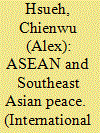

|
|
|
|
|
| Summary/Abstract |
The Southeast Asian peace literature points out at least three points of view regarding regional peace: some emphasize ASEAN's successful security management, others doubt its effectiveness, and a third body of research argues that it is achieved by a ‘capitalist peace’ trajectory. In this article, I refute the capitalist peace argument and construct a theory to bridge the two contradictory perspectives on ASEAN, arguing that the pacifying effect of ASEAN should be understood as a conditional one, which hinges on Southeast Asian countries’ economic performance. For decades, nation building and economic growth have been the main goals of Southeast Asian countries as well as the foundation to their leaders’ rule given the countries' distinct historical backgrounds. When the leaders are not able to maintain good economic performance, they tend to emphasize the nation building issues, such as provoking territorial disputes, to keep their ruling legitimacy, thus compromising ASEAN's security management. Empirical analysis of the onset of militarized interstate disputes from 1950 to 2001 confirms my argument.
|
|
|
|
|
|
|
|
|
|
|
|
|
|
|
|
| 2 |
ID:
154436
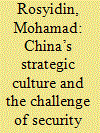

|
|
|
|
|
| Summary/Abstract |
The most challenging task in creating peace in the South China Sea is how to deal with Chinese assertive behavior. This is important since many proposals of the regional security architecture have failed to engage China in order to establish a long-lasting peace in the region. This paper seeks to explain the failure of security management in the South China Sea. Using the concept of strategic culture deriving from constructivism in International Relations, this paper argues that China’s strategic culture is the main factor behind the aggressive behavior in the South China Sea. This culture is rooted from the pre-modern China’s history that has distinct perspective from the Westphalian international law with regard to territorial disputes. This cultural dimension, not the material one, is the key to rethinking security management in the region.
|
|
|
|
|
|
|
|
|
|
|
|
|
|
|
|
| 3 |
ID:
132489
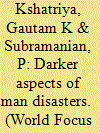

|
|
|
|
|
| Publication |
2014.
|
| Summary/Abstract |
Disaster is a term one would rather be not associated with because of the negative vibes that it sends out. The ways and means to overcome the negative-thoughts that are brought on in the wake of disaster assume a lot of importance. The consequences of disaster have such far reaching and destructive effects that we become helpless individuals running helter skelter to seek protection and also recover from the shock of disaster.
|
|
|
|
|
|
|
|
|
|
|
|
|
|
|
|
| 4 |
ID:
034333
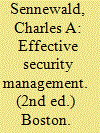

|
|
|
|
|
| Edition |
2nd ed.
|
| Publication |
Boston, Butterworth Publishers, 1985.
|
| Description |
xvi, 338p.Hbk
|
| Standard Number |
0-409-90006-0
|
|
|
|
|
|
|
|
|
|
|
|
Copies: C:1/I:0,R:0,Q:0
Circulation
| Accession# | Call# | Current Location | Status | Policy | Location |
| 027370 | 658.47/SEN 027370 | Main | On Shelf | General | |
|
|
|
|
| 5 |
ID:
190063
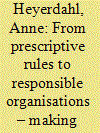

|
|
|
|
|
| Summary/Abstract |
Protective security management aims at protecting against malicious acts. It has, in a relatively short period, undergone substantial changes. One such change is the introduction of risk management. This article investigates a debate about a standard for security risk assessment (SRA) in Norway. It focuses on sense-making by security professionals, drawing on a unique interview material. The analysis utilises Michael Power’s theory on risk governance, as well as insights from security studies. A central finding is that the SRA approach was introduced to create more analytical security management. The importance of analysing one’s values (assets) makes it key to scrutinise the organisation’s characteristics, goals and vulnerabilities, regarded as moving security management in the direction of corporate governance. The article investigates how understanding of risk assessment and security interplay, and identifies a tension between risk (assessment) and the goal of protection, which makes security management risk averse. A requirement of creating sound security is viewed as a potential for burdensome organisational responsibility and blame. The analysis identifies elements of what is often described as resilience (attention towards vulnerabilities), but without the political reading (neo-liberal abdication of the state), thus contributing to the literature on resilience.
|
|
|
|
|
|
|
|
|
|
|
|
|
|
|
|
| 6 |
ID:
134562
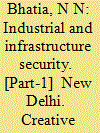

|
|
|
|
|
| Publication |
New Delhi, Creative Crows, 2014.
|
| Description |
xiv, 260p.Pbk
|
| Standard Number |
9788193026175
|
|
|
|
|
|
|
|
|
|
|
|
Copies: C:1/I:0,R:0,Q:0
Circulation
| Accession# | Call# | Current Location | Status | Policy | Location |
| 057941 | 658.47/BHA 057941 | Main | On Shelf | General | |
|
|
|
|
| 7 |
ID:
134563
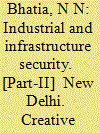

|
|
|
|
|
| Publication |
New Delhi, Creative Crows, 2014.
|
| Description |
xiv, 313p.Pbk
|
| Standard Number |
9788193026182
|
|
|
|
|
|
|
|
|
|
|
|
Copies: C:1/I:0,R:0,Q:0
Circulation
| Accession# | Call# | Current Location | Status | Policy | Location |
| 057942 | 658.47/BHA 057942 | Main | On Shelf | General | |
|
|
|
|
| 8 |
ID:
085953
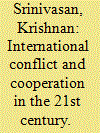

|
|
|
|
|
| Publication |
2009.
|
| Summary/Abstract |
The rise of modern institutional multilateralism is a phenomenon dating back less than a hundred years, and there is no reason to infer that it is either immutable or permanent. With the end of the Cold War, there was an expectation of global consensus and the implementation of collective security. But this depended to an excessive extent on the United States and its willingness to use force, and the level of subjectivity in US-led interventions gave rise to questions of whether multilateralism could survive in conditions of unipolarity. Now the primacy of the United States is slipping, and its pre-eminence will decline as manufacturing, technology and innovation spread. From being the major lending country, it has become the biggest debtor. Despite American military superiority, the world will be increasingly poly-centric and the new emerging powers will exert a strong and increasing influence in world affairs. The character of international cooperation in the next few decades will be shaped by a process by which about half a dozen new major powers seek to mould regional orders of their own. A return to something akin to the 19th-century Concert of Powers seems possible, but this time on a global scale, and with the participation of the emerging strong nations in formal and informal governance structures. The United Nations will continue as a symbol of state sovereignty, and its remit in humanitarian, cultural and developmental good works will be unchallenged, but peace and security decisions at the regional level will be taken by the regional powers on the basis of their self-interest and without reference to the United Nations. Notwithstanding the reasons for the future world order, the existing foundations of security management will not be replaced by anything more reliable, just or legitimate.
|
|
|
|
|
|
|
|
|
|
|
|
|
|
|
|
| 9 |
ID:
130120
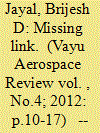

|
|
|
| 10 |
ID:
123917
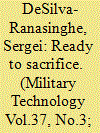

|
|
|
|
|
| Publication |
2013.
|
| Summary/Abstract |
The article focuses on Royal Malaysian Navy (RMN) which is considered as a significant naval force in Southeast Asia. It states that the RMN operates in a complicated security environment and is modernising its old capital assets to adjust to new challenges. It explores RMS' responsibilities which has a maritime area that is twice bigger than its land area. It also tackles Malaysia's efforts to manage bilateral tensions and promote regional dialogue.
|
|
|
|
|
|
|
|
|
|
|
|
|
|
|
|
| 11 |
ID:
052212
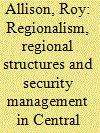

|
|
|
|
|
|
|
|